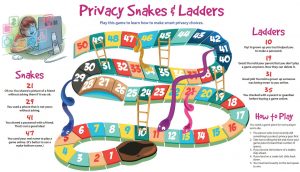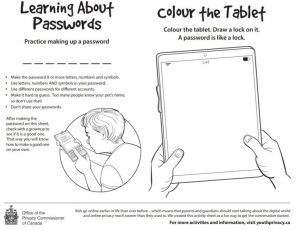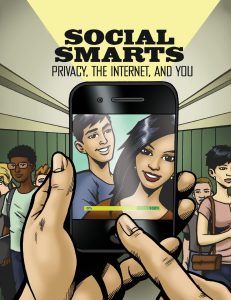Here’s some good back to school advice for students and young people: protecting data is more than fun and games.
To push home the point, the Privacy Commissioner of Canada, along with his provincial and territorial counterparts, has released a series of game-inspired activity sheets and classroom lesson plans to help young Canadians understand various privacy issues. The online materials are available in English and French; paper versions are also available by request.

Privacy Snakes and Ladders is a twist on the classic children’s game that helps players learn how to make smart privacy choices by climbing up a ladder when they make a good decision or sliding down a snake because they have shared a password with a friend, for example. (Supplied image: The Office of the Information and Privacy Commissioner of Alberta)
The games are supposed to be fun but of course the underlying message is very serious: understand the value of data and the importance of protecting personal information online.
Designed to help students, parents and teachers prepare for important discussions and activities, the new lessons have a life-long context, not just a school-day one, said Michael McEvoy, information and privacy commissioner for British Columbia:
“Digital devices offer tremendous learning opportunities for young children; however, they also pose undeniable privacy and safety concerns,” he said. “That’s why digital literacy is so important and a critical aspect of this is starting the conversation about privacy as soon as possible.
“These activity sheets are a step in the right direction: fun, engaging activities that can get children thinking about privacy and their personal information – fundamental concepts that will only grow in importance throughout the rest of their lives.”
While his framing of the issues is spot on; his comments and those of the activity sheets themselves may miss an important target: protecting data is more than an individual issue. While there are important steps proactive steps that individuals can take, threats to data privacy and security are often posed from a systemic, ingrained and built-in level.
The integration of data-based marketing techniques, activity and behaviour tracking tools, and ubiquitous online consumerism has turned our shared market-based system into a huge data vacuum cleaner. Public spaces can be a threat to personal privacy, too, such as in highly wired and highly sensored smart cities where informed consent about data collection is often not possible. Legal and jurisdictional obstacles to public control over private data collecting companies (such as in weakly written laws and weaker-still financial penalties) can be more threatening to our data privacy than weak passwords.
Privacy is an economic, social, even a political issue these days as much as it is a personal one.
So when the phrases like “kids should be thinking about their personal information” so they can “participate in the digital domain while protecting their privacy” (italics added) are uttered, the person speaking may be missing a wider point: data is an even more powerful and profitable tool when it is aggregated and analyzed, collected and collated, and in mass quantities by huge companies. Data is the fuel driving the success of many of today’s top digital conglomerates; their need and ability to collect personal information in huge amounts is often in conflict with an individual’s need or ability to protect it.
We should be talking about protecting our data, our shared data, our public data as much as we talk about protecting our personal information.
As Alberta privacy commissioner Jill Clayton said of the campaign, “Students require knowledge about privacy principles and privacy rights to help them safely navigate their digital world.”
But we are all inhabitants of an interconnected digital world these days. All of us are swept up in the digitization of life, whether we actively and enthusiastically participate or not.
Even if I am careful online, following all the personal information protection advice available, one of my digital buddies may accidentally – carelessly? criminally? – reveal a lot of data about me without my consent or even knowledge – thank you to everyone who filled in one of those personality profiles on Facebook over the past ten years!!
Another example of our interconnected world: Distributed Denial of Service (DDoS) attacks, which can take down popular websites and entire networks in a flood of digital requests sent from a bunch of computers already infected with an attacker’s malware. Those computers have likely been infected as a result of user neglect (not updating software, clicking on unknown email links, poor password protection, etc.), so crashes and hacks and other online threats that could impact us are often made possible by someone else’s general lack of privacy protection awareness or action.
So the new activity sheets, aimed at students in grades 1 to 3, have to start somewhere, and it makes sense to tackle some of the privacy basics first, and in a way that is both fun and engaging: add a privacy twist to familiar children’s games and activities, like the old “Snakes and Ladders” board game.
Players succeed in climbing up the ladder when they make a good privacy decision in the game, but they slide down the slippery snake if they make a wrong move – like sharing a password with a friend.
Building Internet savvy and tech-knowledge is another goal, such as with the word jumble that hides privacy-related terms like “post,” “click” and “footprint” in a scrambled-letter puzzle.

The Colour the Tablet activity encourages students to learn about password protection. (Supplied image: The Office of the Information and Privacy Commissioner of Alberta)
In a game that challenges kids to create a strong and unique eight-character password, students are asked to fill in the blanks and creatively represent how well – or poorly – passwords protect their electronic devices as the “Colour The Tablet”.
These new personal information and data privacy tools build on previous efforts by various Privacy Commissioner to provide the information and knowledge needed by young people to safety navigate the online (and mobile) world. Those efforts include lesson plans for students in grades 6 to 9; they are also available online.
Those lessons do take on some of the meatier issues surrounding personal information protection and data privacy. “Know the Deal”, for example, is a lesson about the value of privacy, the concept of pseudonymity and the powerful notion that privacy is a fundamental human right.
And in a lesson about the privacy rights of kids and teens, consumer rights and personal information protection is reviewed, along with information about privacy principals and legislation in Canada and what legal steps can be taken if someone feels their rights are not being respected or honoured.
An informed discussion about how data privacy and the protection of our personal information is respected or honoured nowadays will certainly be an interesting one, particularly as far as kids, students and young people are concerned.
Interesting or really, really short.
Products specifically aimed at young people – even toddlers – seem to be full of privacy holes: from kids’ smartwatches to home baby monitors and Wi-Fi connected Barbie dolls, connected toys come with built-in access to location tracking data and even open two-way communication channels that can easily be misused.
Unfortunately, it is not just connected products that fail the grade as far as respecting and honouring young people’s data is concerned: educational tools and classroom accessories themselves are suspect.
There are education and classroom service providers that play fast and loose with young people’s online safety, say leading privacy advocates in Canada, and even some classroom material downloaded by teachers can pose a privacy risk for students.
If some product manufacturers and service providers do not honour and respect privacy, it’s often up to the legal system to do so – or at least penalize those that do not.
But perhaps it’s the law that needs to go back to school.
What’s being called the largest legal penalty ever for a violation of children’s privacy rights has just been levied. But that legal penalty is also being called a “pittance” and “a joke”.
The U.S. Federal Trade Commission (FTC) recently ruled that YouTube, and its parent company Google, have been violating the Children’s Online Privacy Protection Act, known as COPPA. Google has agreed to pay the $170 million penalty (a significant amount on its own, sure, but it’s a small portion of the $30.7 billion in profit that the company reported just last year).
From the gadget makers to the platform operators to the legal gatekeepers, it can be hard sometimes to see just who is honouring, respecting or protecting our online privacy, personal information or valuable data.

Awareness tools, activity sheets and educational material from Canada’s Privacy Commissioners are useful, informative and absolutely necessary in ongoing efforts to secure online privacy and the protection of valuable personal and societal data at all levels. (Supplied image: The Office of the Privacy Commissioner of Canada)
Yes, the awareness tools, activity sheets and lesson plans being offered up by Canada’s Privacy Commissioners are informative and absolutely necessary in what must be ongoing efforts to secure online privacy and the protection of valuable personal and societal data at all levels.
Yet there is clearly room for building on the agenda, expanding the curriculum and enhancing the tools themselves.
For anyone developing such tools or advocating their use, here’s some more back to school advice to consider:
“I believe that adult hypocrisy is the biggest problem children face…”
That’s Marian Wright Edelman, a longtime activist for children’s rights and the founder of the Children’s Defense Fund. That was 2007, and she was not (yet) speaking about the Internet.
-30-



